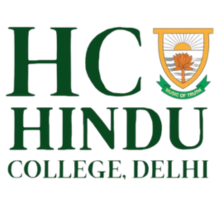Hindu College, University of Delhi

Hindu College, All India Ranking 1 in the National Institutional Ranking Framework (NIRF), 2024, Ministry of Education, Government of India, stands as a premier institution of higher learning in India. The college actively fosters the principles of green chemistry by integrating academic instruction, research initiatives, and sustainability-oriented events.
The institution offers a comprehensive array of structured programs aimed at equipping undergraduate students with knowledge and skills in sustainable chemical practices. These include discipline-specific elective course entitled “Green Chemistry” and skill enhancement course entitled “Green Methods in Chemistry. In a recent and notable development, the college launched a 40-hour Certificate Course in Green Chemistry, conducted under the auspices of the Green Chemistry Network Centre (GCNC), functioning from Hindu College. This specialized program includes both lectures and hands-on workshops led by eminent academicians and field experts.
The GCNC at Hindu College has been serving as a prominent centre for promoting sustainable chemical science through integrated efforts in education, research, and international partnership. Established under the mentorship of globally renowned leaders in green chemistry, the GCNC plays a pivotal role in fostering environmental stewardship within the chemical sciences.
The Centre’s objectives include:
• Facilitating interdisciplinary exchange of knowledge among industrialists, academicians, chemists, and engineers engaged in green chemistry.
• Developing and disseminating educational resources on green chemistry for educational institutions at all levels, including the design of environmentally benign laboratory experiments.
• Promoting best practices in teaching and research to minimize hazardous waste and enhance both environmental and human health.
Through these initiatives, Hindu College continues to lead by example, nurturing a new generation of scientists committed to sustainable innovation and ecological responsibility.
Chemistry Master of Science (M.S.), Chemistry Doctor of Philosophy (Ph.D.)
General Chemistry, Organic Chemistry, Inorganic Chemistry, Green Chemistry stand-alone course, Faculty Research, Student Research, Student Chapter/Club Activities and/or Outreach
1) ACS Student Chapter University of Delhi 2) Prof. R. K. Sharma (rksharmagreenchem@hotmail.com)
Hindu College, University of Delhi, has set forth a combination of short-term and long-term goals to implement and promote green chemistry across academic, research, and institutional practices. The institute has been consistently conducting various add-on courses/certificate courses focused on Green Chemistry through its GCNC, along with a significant number of extension and outreach activities under the aegis of the DBT Star College Scheme, actively integrating green chemistry practices into teaching laboratories.
In the short term, the college aims to expand its course offerings by introducing additional certificate, elective, and skill-based programs focused on green chemistry, along with hands-on workshops and laboratory training sessions; faculty development programs to equip educators with the tools to embed sustainability principles in their teaching. Student engagement is encouraged through awareness campaigns, seminars, and collaborative events hosted by the Green Chemistry Network Centre (GCNC). Over the long term, the college envisions a deeper integration of green chemistry into the core curriculum, transforming its laboratories into models of sustainable practice with energy-efficient equipment and eco-friendly protocols. It also aims to establish itself as a hub for undergraduate research in sustainable chemistry and to foster strategic collaborations with industry and international institutions. Furthermore, Hindu College aspires to extend its impact beyond campus through community outreach and policy advocacy, positioning itself as a leader in environmentally responsible science education.
1. Anastas, P. T., & Warner, J. C. (2000). Green chemistry: theory and practice. Oxford university press.
2. Srivastava, A., & Sharma, R. K. (Eds.). (2021). Green Chemistry for Beginners. CRC Press.
3. Kirchoff, M. (2009). Green chemistry education.
4. Anastas, P., & Eghbali, N. (2010). Green chemistry: principles and practice. Chemical Society Reviews, 39(1), 301-312.
5. Li, C. J., & Anastas, P. T. (2012). Green Chemistry: present and future. Chemical Society Reviews, 41(4), 1413-1414.
6. https://www.acs.org/green-chemistry-sustainability.html
7.https://www.beyondbenign.org/
